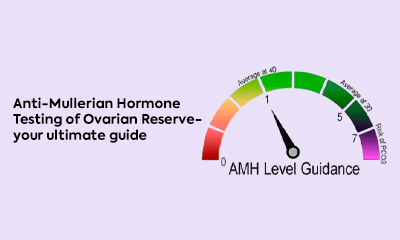
The Anti-Müllerian Hormone (AMH) test serves as a crucial diagnostic tool that enables reproductive specialists to evaluate a woman’s remaining egg supply. At KIC Delfinium in Delhi, we utilize this essential assessment to help women understand their fertility status and develop appropriate treatment strategies for their reproductive goals.
Low AMH Treatment in Delhi
KIC Delfinium stands as Delhi’s premier fertility center, offering cutting-edge reproductive medicine with a team of experienced specialists. Our comprehensive approach combines advanced diagnostic capabilities with personalized care, ensuring that every patient receives optimal low AMH treatment in Delhi and other fertility challenges.
Understanding Anti-Müllerian Hormone (AMH)
AMH represents a hormone secreted by granulosa cells within small ovarian follicles during their early developmental phases. These developing follicles, typically measuring under 4mm, produce AMH until they reach approximately 8mm in diameter, at which point production ceases.
The unique characteristic of AMH lies in its consistency throughout a woman’s menstrual cycle, making it an exceptionally reliable biomarker for ovarian reserve assessment. This stability allows for convenient testing at any time of the month.
The Role of AMH in Fertility Evaluation
AMH serves as an indicator of the developing follicle population, which correlates with the reserve of dormant eggs (primordial follicles). Several key points define its importance:
- Natural aging processes lead to declining follicle reserves, resulting in decreased AMH concentrations
- Conditions such as Polycystic Ovary Syndrome (PCOS) typically present with elevated AMH readings
- Women approaching menopause or experiencing diminished ovarian reserve generally exhibit reduced AMH levels
- While AMH indicates egg quantity, it doesn’t necessarily reflect egg quality
AMH Testing and IVF Treatment Outcomes
Clinical research demonstrates important correlations between AMH levels and IVF success:
Higher AMH Levels:
- Enhanced response to fertility medications
- Increased egg retrieval numbers during IVF cycles
- Greater likelihood of obtaining viable embryos for transfer or cryopreservation
Lower AMH Levels:
- May indicate reduced ovarian response but don’t preclude IVF success
- Younger women (under 35) can still achieve positive outcomes despite low AMH
At KIC Delfinium, our specialists integrate AMH results with comprehensive ultrasound evaluations and hormonal assessments to create individualized treatment protocols.
AMH Level Classifications
While no universal standards exist, these reference ranges apply to women under 35:
AMH Range |
Clinical Interpretation |
| Above 4.0 ng/ml | Elevated (potentially PCOS-related) |
| 1.5 – 4.0 ng/ml | Optimal range |
| 1.0 – 1.5 ng/ml | Lower normal |
| 0.5 – 1.0 ng/ml | Reduced |
| Below 0.5 ng/ml | Significantly low |
It’s crucial to understand that fertility exists on a spectrum, and small numerical differences (such as between 0.9 and 1.1 ng/ml) may not represent clinically significant variations.
Comprehensive Ovarian Reserve Evaluation
Antral Follicle Count (AFC): Ultrasound-based counting of visible small follicles in both ovaries
Early Cycle Hormone Testing: Day 3 FSH and estradiol measurements to assess hormonal balance
Ovarian Stimulation Tests: Specialized protocols to evaluate ovarian responsiveness
These complementary assessments provide a comprehensive understanding of reproductive potential when used together.
Advanced Treatment Approaches for Low AMH
Low AMH levels present challenges but don’t eliminate pregnancy possibilities. KIC Delfinium offers sophisticated treatment options including:
Customized Stimulation Protocols: Modified IVF approaches designed for women with reduced ovarian response, including specialized medication regimens
Enhanced Embryo Techniques: Advanced laboratory procedures such as assisted hatching to improve implantation rates
Fertility Preservation: Egg freezing options for women seeking to preserve reproductive potential
Donor Egg Programs: Comprehensive donor egg IVF services for cases with severely compromised ovarian reserve
Our reproductive specialists develop individualized treatment plans considering each patient’s age, overall health, and family planning objectives.
Common Questions About AMH Testing and Treatment
Q: Does low AMH definitively indicate infertility? A: No. While low AMH suggests fewer available eggs, conception remains possible through various treatment approaches.
Q: Is it possible to naturally increase AMH levels? A: AMH levels primarily reflect existing ovarian reserve and typically don’t increase significantly. However, maintaining optimal health through proper nutrition, exercise, and stress management can help maximize treatment success even with low AMH.
Q: When should I consider AMH testing in Delhi? A: We recommend AMH testing for women over 30, those experiencing conception difficulties, or anyone considering fertility preservation. At KIC Delfinium, testing can be performed any day of your cycle.
Q: What treatment options work best for low AMH in Delhi? A: Treatment selection depends on individual factors including age, overall health, and reproductive goals. Our specialists may recommend modified IVF protocols, fertility preservation, advanced embryo techniques, or donor egg programs based on specific circumstances.
Q: What does AMH testing cost in Delhi? A: Testing costs vary among facilities. At KIC Delfinium, we provide accurate AMH testing as part of comprehensive fertility evaluations at competitive rates, ensuring accessibility to quality care.
For personalized consultation and advanced fertility care in Delhi, contact KIC Delfinium to schedule your AMH test and fertility evaluation with our experienced reproductive specialists.

